Madrasa E-Learning Platform Offline Tools Delivered To More Than 10,000 Students, Teachers In Tunisia And Mauritania
As part of Madrasa for 1,000 villages, the Mohammed bin Rashid Al Maktoum Global Initiatives (MBRGI) provided high-tech educational offline solutions to students at far-flung villages across Tunisia and Mauritania in collaboration with the Emirates Red Crescent.
The Madrasa e-learning platform, which provides over 5,000 free Arabised science and math videos, will benefit up to 10,000 students and teachers in remote areas without internet access across both countries. As part of the mission, students and teachers in Tunisia and Mauritania received 300 Madrasa tablets, 14 Wi-Fi hotspot devices that extend to 500 meters of coverage, 180 flash memories (USBs), and 11 Madrasa Smart Bags. Each Bag provides a full mobile classroom of 20 tablets, a portable projector, speakers and central charging units.
The first-of-their-kind solutions don’t require internet access or ultra-modern technological infrastructure, but still respond to the residents’ need for improved access to modern educational resources and ICT technologies.
During the visit, 279 units were distributed in Tunisia, in collaboration with Tunisian Ministry of Education, SOS Children Villages and the UAE’s embassy in Tunisia. The visit covered remote mountainous and rural areas within ten regions in six cities, namely, Gammarth, Siliana, Akouda, Kairouan, Jendouba and Ayn Darahim. The team succeeded in delivering solutions to more than 4,000 learners from 42 villages.
In Mauritania, the team coordinated with the local ministries of education and the UAE embassy to distribute 208 units across the country. The journey began in the suburbs of the country’s capital Nouakchott, in the presence of local senior officials. It then moved to remote desert areas, covering nine sites in five provinces, including Tevragh Zeina, Riyadh, Tabart, R’ Kiz and Al-Fath. The distributed devices benefited up to 6,000 learners from 120 villages.
Madrasa’s offline solutions equipped with 5,000 free Arabised videos in math, general science, chemistry, physics, and biology subjects from grade 1 to grade 12 aims to make education accessible to everyone in the Arab world.
Saeed Al Eter, Assistant Secretary-General of MBRGI said, “The increasing momentum witnessed in the project demonstrates the necessity of such creative projects aimed at spreading knowledge in remote areas. Such projects are imperative to empowering new generations with access to knowledge of ICT technologies in remote areas.”
Speaking of the occasion, His Excellency Hatem Ben Salem, Minister of Education, Republic of Tunisia, said, “We are pleased to collaborate with Madrasa to deliver its innovative edu-tech solutions to students in far-flung areas. Working on this mission reflects the Ministry’s keenness to cooperate with stakeholders in brotherly countries to improve the quality of education and create hope for students.”
He added, “Our cooperation with the UAE representatives was fruitful, reflecting the solid relations between the two countries, and we look forward to the positive impact of this initiative.”
His Excellency Mohamed Malainine Ould Eyih, Minister of Secondary Education and Technical and Vocational Training in Mauritania, said, “We are pleased to cooperate with Emirati cadres to spread education across the republic with a view to building a better future for students. The educational content provided by Madrasa is of great value, which encouraged the Ministry officials to welcome the initiative and provide support to achieve our shared goals.”
Dr. Waleed Al Ali, Director of the Madrasa e-learning platform, said, “The warm welcome and close cooperation the project team enjoyed during their visit heralds the success of the project in consolidating a culture of self-learning among thousands of students who speak Arabic. We witnessed a common keenness on providing students with a bright future and in consolidating the foundations of Arab development through spreading knowledge even in remote areas.”
In October 2018, His Highness Sheikh Mohammed bin Rashid Al Maktoum, Vice President and Prime Minister of UAE and Ruler of Dubai, launched Madrasa e-learning platform (www.madrasa.org) to provide 5,000 free Arabised videos in general science, mathematics, biology, chemistry and physics for more than 50 million Arab students from kindergarten to grade 12.
In February 2019, the project expanded to Madrasa for 1,000 villages aimed to support learning for Arab students living in villages, remote areas and refugee camps with no internet access. The platform harnesses four innovative offline solutions to deliver high-tech educational content to students without internet access.
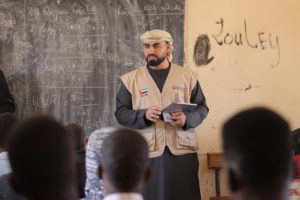
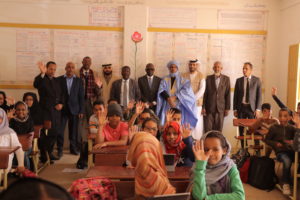
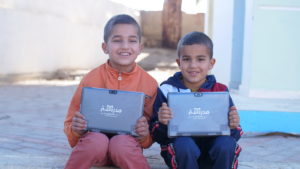
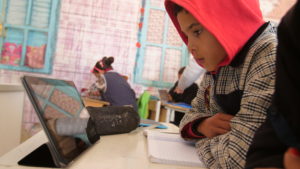



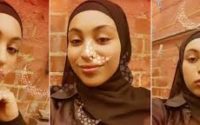

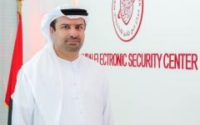

 Email: info@cyber-gear.com
Email: info@cyber-gear.com